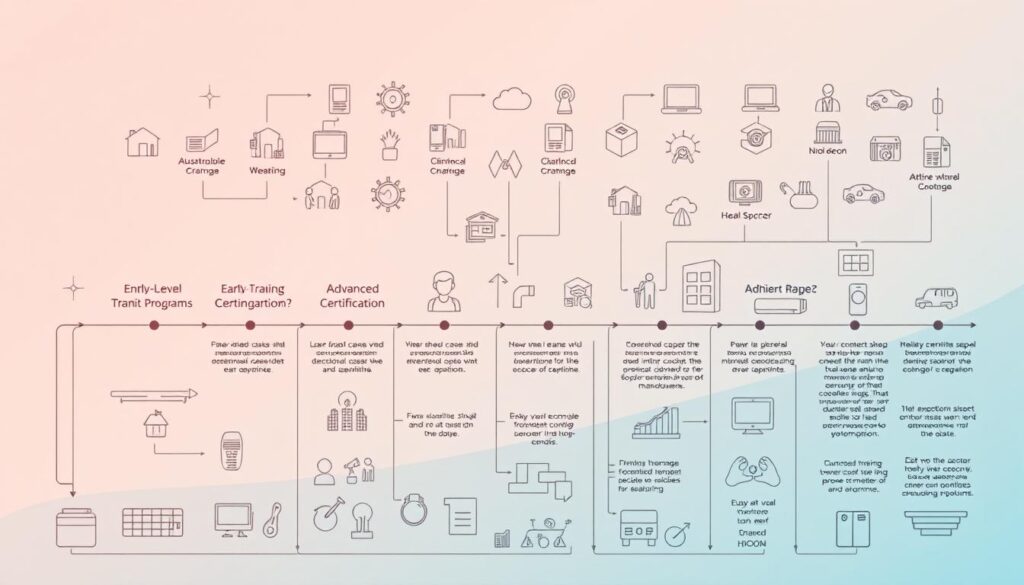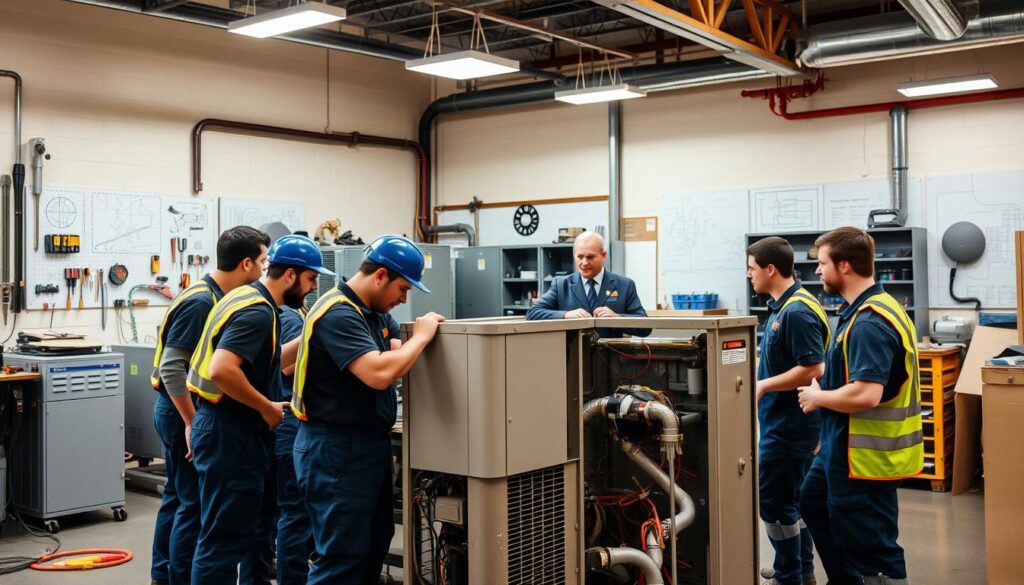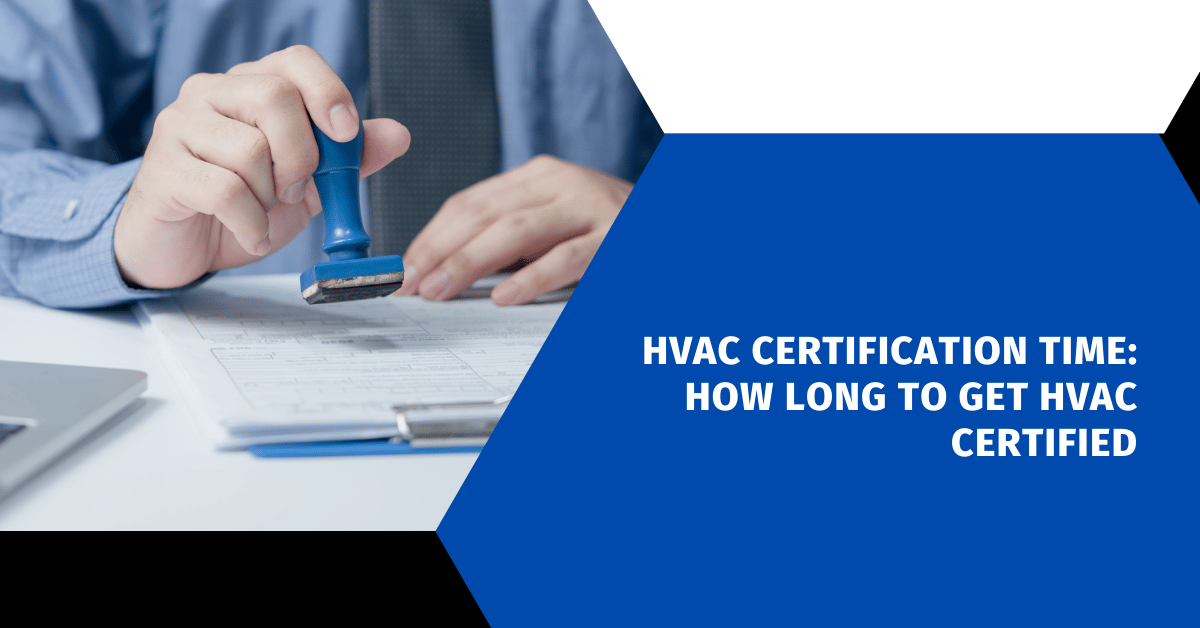Affiliate Disclosure
HVAC Guide Guys is a participant in the Amazon Services LLC Associates Program, an affiliate advertising program designed to provide a means for sites to earn advertising fees by advertising and linking to Amazon.
How Long to Get HVAC Certified? Are you curious about turning your technical passion into a successful HVAC career? The journey to HVAC certification might seem daunting. But knowing the timeline could be your ticket to success in this exciting field.

The HVAC industry is booming, with over 415,800 Heating, Air Conditioning, and Refrigeration Mechanics and Installers across the country. Your path to becoming certified depends on your education and career goals.
Figuring out how long it takes to get HVAC certified involves looking at different options. You can choose from vocational schools to apprenticeships. Some programs can be finished in under a year, while others might take 3-5 years.
The time it takes to get certified is not just about the duration. It’s about gaining deep knowledge of complex systems, safety, and technical skills. Your dedication and educational choice will decide how fast you can become certified.
Key Takeaways
- HVAC certification can take 1-5 years depending on your educational path
- Multiple routes exist for becoming a certified HVAC technician
- Vocational schools offer accelerated training options
- Apprenticeship programs provide hands-on experience
- Certification demonstrates professional competence in the HVAC industry
Table of Contents
Understanding HVAC Certification Basics
HVAC certification programs are key for those wanting to succeed in heating, ventilation, air conditioning, and refrigeration. They show your technical skills and industry expertise.
Getting into HVAC technician certification can seem tough. But knowing the basics is essential for your career growth. Let’s dive into what certification is and why it’s important.
What is HVAC Certification?
An HVAC certification proves your technical knowledge and skills. It usually involves:
- Passing standardized exams
- Demonstrating practical work experience
- Meeting specific industry requirements
Why Certification Matters
Certification is more than a piece of paper. It offers big benefits in the competitive HVAC job market:
- Increased job opportunities
- Higher earning power
- Professional credibility
- Proof of technical competence
Key Industry Standards
The HVAC industry has its own standards for certification. The EPA Section 608 Technician Certification is legally needed for refrigerant work. Many employers want certified technicians, which can open up more career paths.
According to the U.S. Bureau of Labor Statistics, postsecondary education and certification can dramatically improve employment opportunities in the HVAC field.
HVAC technician jobs are expected to grow 4% with average hourly wages from $14.94 to $30.58. Getting certified is a wise career choice.
Explore Our HVAC Shop
Looking for top-rated HVAC tools, parts, and accessories? Visit our shop and find the perfect solution for your needs.
Visit the ShopHow Long to Get HVAC Certified: Timeline Overview
Starting your HVAC technician career has a flexible timeline. It depends on several factors. The time to get certified can be from 6 months to 2 years. This gives you many ways to start your journey in this exciting field.
Knowing the hvac training timeline is key to planning your career. There are different paths to certification, each with its own benefits:
- Certificate Programs: 6 months
- Associate Degree: Up to 2 years
- Apprenticeship: 3-5 years
- EPA 608 Certification: 2-6 weeks
Your personal situation affects how long it takes. Students who study full-time usually finish faster than those who study part-time. Some programs are faster, letting you start working sooner.
| Certification Type | Typical Duration | Career Impact |
|---|---|---|
| Entry-Level Certificate | 6 months | Basic qualification |
| Journeyman Certificate | 1-2 years | Advanced skills |
| Master Certificate | 3-5 years | Expert-level expertise |
Pro tip: Always check your state’s licensing rules. They can change a lot from one place to another.
Types of HVAC Certifications Available
Exploring HVAC certification courses means learning about different credentials. To become a skilled HVAC technician, you need to get several key certifications. These show you know your stuff.
There are many HVAC certificate programs out there. They offer specialized certifications to boost your career. Each one shows you’re good at certain heating, ventilation, air conditioning, and refrigeration tasks.
EPA 608 Certification Requirements
The EPA 608 Certification is a must for HVAC pros working with refrigerants. It comes in four types:
- Type I: Small appliances
- Type II: High-pressure appliances
- Type III: Low-pressure appliances
- Universal: Covers all types of equipment
NATE Certification Process
The North American Technician Excellence (NATE) Certification has several levels:
- Ready-to-Work Certificate (entry-level)
- HVAC Support Technician Certificate (6-12 months experience)
- Professional Certification (2+ years of experience)
- Senior Level Efficiency Analyst (highest credential)
State-Specific Licensing
Understanding state-specific requirements is part of your HVAC journey. Some states have strict licensing, while others are more relaxed. Always check your local rules to follow HVAC certification standards.
Professional tip: Keep your certifications up to date to stay ahead in the HVAC field.
Explore Our HVAC Shop
Looking for top-rated HVAC tools, parts, and accessories? Visit our shop and find the perfect solution for your needs.
Visit the ShopEducational Pathways for HVAC Certification

Exploring HVAC certification programs offers many ways to start your career in heating, ventilation, and air conditioning. Your educational path can change based on your goals and personal situation.
When looking at HVAC training, you’ll find several main educational paths:
- Vocational or Trade School Programs
- Associate Degree Programs
- Certificate Programs
- Apprenticeship Programs
Trade school programs are the quickest way to get HVAC certification. They can be finished in 6 months to 1 year. These programs give you intense, practical training to get you ready for entry-level HVAC jobs.
| Educational Path | Duration | Key Benefits |
|---|---|---|
| Vocational School | 6-12 months | Quick entry, hands-on training |
| Associate Degree | 2 years | Comprehensive education, broader career opportunities |
| Apprenticeship | 3-5 years | Paid on-the-job training, mentorship |
Apprenticeship programs are another option. They mix classroom learning with real-world experience. These programs last 3 to 5 years and let you learn HVAC skills while earning money.
Your choice of HVAC certification program should match your career goals, time, and budget. Each path has its own benefits for a successful HVAC career.
HVAC Trade School Programs and Duration
Choosing the right HVAC certification courses can change your career path. Trade school programs offer different paths to becoming a certified HVAC professional. They are designed for various schedules and learning styles.
When looking at hvac certificate programs, you’ll find many learning formats. The duration and structure of these programs vary. This gives you flexibility in your education.
Full-Time vs Part-Time Study Options
HVAC trade school programs usually have two main paths:
- Full-Time Programs: Intensive courses finished in 6-12 months
- Part-Time Programs: Flexible schedules that last 18-24 months
Accelerated Program Opportunities
Some schools offer accelerated hvac certification courses. These can be finished in as little as 8 months. They pack traditional curriculum into a quicker, more focused learning experience.
| Program Type | Duration | Typical Curriculum |
|---|---|---|
| Certificate Program | 6-12 months | Basic technical skills |
| Associate’s Degree | 2 years | Comprehensive technical training |
| Accelerated Program | 8-9 months | Intensive skill development |
Program Cost Considerations
Investing in hvac certificate programs needs careful financial planning. Costs vary from $1,200 to $15,000. This depends on the program’s length and complexity. Many schools offer financial aid, scholarships, and flexible payment plans to help with costs.
Pro tip: Research multiple trade schools and compare their program offerings, costs, and job placement rates before making your final decision.
Explore Our HVAC Shop
Looking for top-rated HVAC tools, parts, and accessories? Visit our shop and find the perfect solution for your needs.
Visit the ShopApprenticeship Route to HVAC Certification

Starting an HVAC apprenticeship is a great way to become a certified technician. These programs mix practical training with classroom learning. You’ll spend 3 to 5 years learning the trade, gaining essential skills.
As an apprentice, you’ll get real-world experience and earn a good salary. Here’s what you can look forward to:
- Total training hours: 2,000 to 3,000 hours of practical work
- Classroom instruction: Approximately 600 hours of technical education
- Average starting salary: Around $24,315 per year
The apprenticeship is designed to make you a well-rounded professional. You’ll work with experienced technicians. You’ll learn about system installations, maintenance, and repairs.
| Apprenticeship Stage | Typical Duration | Key Learning Outcomes |
|---|---|---|
| Initial Training | First Year | Basic skills, safety protocols |
| Intermediate Development | Years 2-3 | Advanced technical skills |
| Advanced Specialization | Years 4-5 | Specialized systems, certification preparation |
After your apprenticeship, your career will take off. Experienced HVAC technicians can make up to $80,000 annually. You’ll have chances to grow in residential, commercial, and industrial fields.
Pro Tip: Research local union programs and technical schools to find the best apprenticeship opportunities in your area.
Required Skills and Prerequisites
Becoming an HVAC technician needs a mix of education, technical skills, and physical strength. Knowing the hvac certification requirements is key for those thinking about this career.
Educational Requirements
To get hvac technician certification, you need a good education. Most employers and programs ask for:
- High school diploma or equivalent GED
- Basic math and physics knowledge
- Good reading and understanding skills
Technical Competencies
Good HVAC technicians have to know a lot of technical stuff, like:
- Understanding electrical systems
- Refrigeration basics
- How to diagnose mechanical systems
- Using computer-aided design (CAD) software
- Reading technical blueprints
Physical Demands
The HVAC job is tough physically. You’ll need to:
- Lift heavy stuff (up to 50 pounds)
- Work in small spaces
- Stand for a long time
- Climb ladders and get into tight spots
Pro Tip: Meeting these needs might seem tough, but the HVAC field has great career chances. The Bureau of Labor Statistics says there will be a 5% job growth from 2020 to 2030. This means over 38,500 new jobs will open up.
Explore Our HVAC Shop
Looking for top-rated HVAC tools, parts, and accessories? Visit our shop and find the perfect solution for your needs.
Visit the ShopCertification Exam Preparation Time
Getting ready for HVAC certification exams needs careful planning and lots of study time. Your success depends on knowing what the exam requires and making a good study plan.
The time it takes to prepare for HVAC certification exams varies. It depends on your experience and how you learn. Usually, people spend 3-6 months getting ready for these exams. How well you prepare can affect how long it takes to get certified.
- Certificate program preparation: 2-4 months
- Associate degree exam preparation: 4-6 months
- Apprenticeship exam readiness: 6-12 months
When planning your hvac training timeline, think about these important study tips:
- Sign up for exam prep courses
- Use official study guides
- Take many practice tests
- Join study groups
- Make a study schedule and stick to it
Different hvac certification exams need different amounts of study time. The EPA 608 certification usually takes 1-2 months of focused study. But, exams like NATE can need 4-6 months of prep.
Pro tip: Make a detailed study plan that fits with your work and personal life. Many experts suggest spending 10-15 hours a week on exam prep.
Career Advancement and Specialized Certifications
Your career in HVAC can grow a lot with learning and getting special certifications. HVAC certification programs help you improve your skills and become more attractive to employers.
Getting specialized certifications can really change your career path. By getting advanced HVAC technician certifications, you open up new chances and show you know more than basic skills.
- Universal EPA Certificate – covering all refrigerant system types
- NATE Professional Certifications
- HVAC Excellence Advanced Credentials
- Green Technology Specializations
Most employers want technicians with a wide range of certifications. The Universal EPA Certificate is a top choice. It shows you’re good at many HVAC systems.
| Certification Level | Experience Required | Career Impact |
|---|---|---|
| Entry-Level | 0-1 years | Basic Job Opportunities |
| Professional | 2-5 years | Higher Earning |
| Master Technician | 5+ years | Advanced Project Management |
Staying committed to learning with HVAC certification programs will make you stand out. Specialized certifications not only boost your pay but also let you work with the latest HVAC tech.
Explore Our HVAC Shop
Looking for top-rated HVAC tools, parts, and accessories? Visit our shop and find the perfect solution for your needs.
Visit the ShopCost and Investment Analysis for HVAC Certification
Getting HVAC certification needs good financial planning. The cost of hvac certification courses can be from a few hundred to several thousand dollars. This depends on the program and your career goals.
It’s key to understand the financial commitment for those wanting to be HVAC pros. The total cost includes several main parts:
Training Program Expenses
HVAC certificate programs have different costs and lengths:
- Online programs: $800 to $3,000
- In-person trade schools: Up to $15,000
- Community college programs: $2,000 to $10,000
Certification Exam Fees
Certification costs have several parts:
- Initial licensing fees: $100 to $300
- Annual renewal fees: $50 to $150
- EPA Section 608 Certification: Varies by type of exam
Tools and Equipment Investment
Buying your first tools is a big part of hvac certificate programs. Professional tools can cost between $1,500 to $3,000. This is a big upfront cost.
Many HVAC professionals find they can quickly recoup training costs through increased earnings.
Despite the initial cost, the HVAC industry offers good financial chances. With a 9% job growth rate and wages from $58,490 to $66,840, your certification can bring big long-term gains.
Conclusion
Getting an HVAC certification is a smart career choice. Knowing how long it takes to get certified helps you plan better. The time it takes varies from six months to five years, depending on your path.
The HVAC field is growing fast, with a 5% growth rate expected. There will be about 19,000 new jobs by 2030. Getting certified can lead to a good salary, up to $79,630 in Alaska.
Staying updated with your skills is key in the HVAC world. Each state has its own rules for certification. But, with the right training and exams, you’ll stand out in this field.
Your HVAC certification is a big step towards a fulfilling career. It doesn’t matter if you choose a short program or a longer apprenticeship. Your hard work will lead to great opportunities in the HVAC industry.
FAQ
How long does it typically take to get HVAC certified?
What are the different types of HVAC certifications?
Do I need a high school diploma to become an HVAC technician?
How much does HVAC certification cost?
How long does it typically take to get HVAC certified?
What are the different types of HVAC certifications?
Do I need a high school diploma to become an HVAC technician?
How much does HVAC certification cost?
FAQ
How long does it typically take to get HVAC certified?
Getting HVAC certified can take different amounts of time. Trade school programs last 6-24 months. Apprenticeships usually take 3-5 years. Quick certifications like EPA 608 can be done in weeks.
But, becoming a fully qualified HVAC technician often needs education, training, and experience.
What are the different types of HVAC certifications?
There are several HVAC certifications. The EPA 608 is for handling refrigerants. NATE certification focuses on technical skills. State-specific licenses also exist.
Each certification has its own requirements and focuses on different areas of HVAC knowledge and skills.
Do I need a high school diploma to become an HVAC technician?
Yes, you need a high school diploma or GED. Employers and most certification programs require it. You also need good math, physics, and mechanical skills.
How much does HVAC certification cost?
Costs vary a lot. Trade school programs can cost
FAQ
How long does it typically take to get HVAC certified?
Getting HVAC certified can take different amounts of time. Trade school programs last 6-24 months. Apprenticeships usually take 3-5 years. Quick certifications like EPA 608 can be done in weeks.
But, becoming a fully qualified HVAC technician often needs education, training, and experience.
What are the different types of HVAC certifications?
There are several HVAC certifications. The EPA 608 is for handling refrigerants. NATE certification focuses on technical skills. State-specific licenses also exist.
Each certification has its own requirements and focuses on different areas of HVAC knowledge and skills.
Do I need a high school diploma to become an HVAC technician?
Yes, you need a high school diploma or GED. Employers and most certification programs require it. You also need good math, physics, and mechanical skills.
How much does HVAC certification cost?
Costs vary a lot. Trade school programs can cost $1,500 to $15,000. Apprenticeships might be free or low-cost. Certification exams cost $50 to $300.
Other expenses include tools, study materials, and licensing fees.
What are the different ways to get HVAC certified?
You can get certified through trade schools, community colleges, apprenticeships, or online courses. Each method has its own benefits and timelines. You can choose what fits your goals best.
Is HVAC certification required in all states?
No, certification rules vary by state. Some states require specific licenses or certifications. Others have more flexible rules. Always check your state’s rules before starting your training.
Can I get HVAC certified online?
Some online courses are available. But, HVAC certification usually needs hands-on training. Many programs offer a mix of online classes and in-person training.
What is the EPA 608 Certification?
The EPA 608 Certification is needed for technicians working with refrigerants. It has four types: Type I, Type II, Type III, and Universal. The Universal type covers all refrigeration systems.
How long does an HVAC apprenticeship typically last?
HVAC apprenticeships last 3-5 years. They combine on-the-job training with classroom learning. You need 2,000 hours of paid training and 144 hours of technical education each year.
What skills do I need to become an HVAC technician?
You need mechanical aptitude, electrical knowledge, and problem-solving skills. Physical strength, customer service skills, and comfort in different environments are also important. Technical skills in refrigeration, heating, ventilation, and electrical work are key for success.
,500 to ,000. Apprenticeships might be free or low-cost. Certification exams cost to 0.
Other expenses include tools, study materials, and licensing fees.
What are the different ways to get HVAC certified?
You can get certified through trade schools, community colleges, apprenticeships, or online courses. Each method has its own benefits and timelines. You can choose what fits your goals best.
Is HVAC certification required in all states?
No, certification rules vary by state. Some states require specific licenses or certifications. Others have more flexible rules. Always check your state’s rules before starting your training.
Can I get HVAC certified online?
Some online courses are available. But, HVAC certification usually needs hands-on training. Many programs offer a mix of online classes and in-person training.
What is the EPA 608 Certification?
The EPA 608 Certification is needed for technicians working with refrigerants. It has four types: Type I, Type II, Type III, and Universal. The Universal type covers all refrigeration systems.
How long does an HVAC apprenticeship typically last?
HVAC apprenticeships last 3-5 years. They combine on-the-job training with classroom learning. You need 2,000 hours of paid training and 144 hours of technical education each year.
What skills do I need to become an HVAC technician?
You need mechanical aptitude, electrical knowledge, and problem-solving skills. Physical strength, customer service skills, and comfort in different environments are also important. Technical skills in refrigeration, heating, ventilation, and electrical work are key for success.

